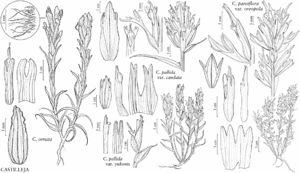Difference between revisions of "Castilleja pallida var. yukonis"
Phytologia 90: 76. 2008.
FNA>Volume Importer |
FNA>Volume Importer |
Revision as of 18:27, 24 September 2019
Herbs perennial. Stems: hairs spreading, ± matted, long, eglandular, mixed with retrorse, short ones, rarely short stipitate-glandular ones. Leaves linear to linear-lanceolate, 1.5–10.5 cm, apex acuminate; lobe apex acute. Inflorescences 3–7 cm; bracts yellowish throughout, sometimes orangish or reddish, sometimes green with margins yellow or cream, lanceolate to oblong. Calyces proximally pale green, distally light yellow, (13–)16–18.5 mm; abaxial and adaxial clefts 6–9 mm, 45–55% of calyx length, lateral 0.3–2(–4) mm, 2–20% of calyx length; lobes triangular to ovoid. Corollas straight, 12–22(–28) mm; tube 10–20 mm; beak margins light yellow; abaxial lip greenish yellow, orange-brown, or red, 4–6 mm. 2n = 48.
Phenology: Flowering Jun–Aug.
Habitat: Dry grasslands, bluffs, eskers, pingos, alluvial plains, shores, open slopes, gravelly roadsides.
Elevation: 600–1100 m.
Distribution
N.W.T., Yukon, Alaska.
Discussion
Variety yukonis is primarily limited to central and southern Yukon, though it also likely occurs at least sporadically in the adjacent portions of eastern Alaska. Reports of this variety from Asia are doubtful. Its status in the Mackenzie River delta region in the Northwest Territories is still unclear, and plants from that region may be referable to variably colored populations of Castilleja raupii. See additional notes for this form under 81. C. pallida.
Selected References
None.
